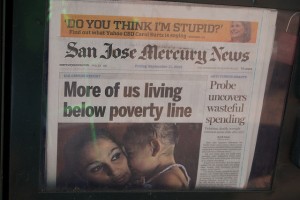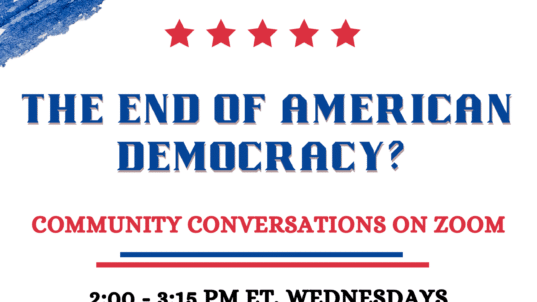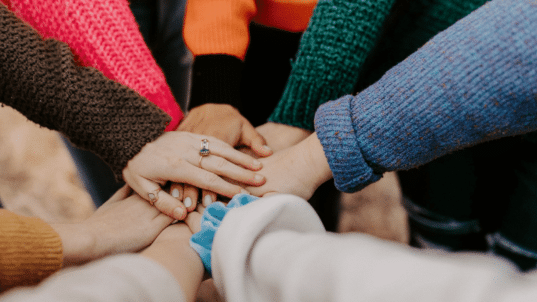 The National Dialogue Network (NDN) spent over a year planning and organizing the initial phases of a national dialogue on a topic of public concern, relying on practitioners within the public participatory sphere to assist and comment. Cooperating practitioners assisted in selecting and framing the concern of the first NDN dialogue project: poverty.
The National Dialogue Network (NDN) spent over a year planning and organizing the initial phases of a national dialogue on a topic of public concern, relying on practitioners within the public participatory sphere to assist and comment. Cooperating practitioners assisted in selecting and framing the concern of the first NDN dialogue project: poverty.
I first heard of the effort at the National Coalition for Dialogue and Deliberation (NCDD) conference in Seattle, Washington in the Fall of 2012. It was my intent from the outset to personally facilitate a small group discussion for the project. I had advocated for a national discussion of either climate impacts or the role of money in political campaigns, but was satisfied that the chosen concern of poverty would provide a useful experiential basis for national dialogue.
By late Summer of 2013 the NDN was actively soliciting practitioner participation in facilitating “Phase 3” of the project: local discussion of the materials developed on questions surrounding poverty and wealth. I facilitated one such discussion in Iowa County, Wisconsin, a rural area about an hour’s drive west of Madison. Three of my participants had prior experience in public discussions sponsored by the Interactivity Foundation (IF) and one of those had participated previously in public discussion of material produced by Kettering Foundation/National Issues Forum (KF/NIF).
The NDN discussion materials are very different than IF discussion reports or KF/NIF discussion guides. IF reports usually pose six to eight contrasting conceptual policy possibilities and KF/NIF guides usually focus on three somewhat more developed policy approaches that often reflect some alternatives and some middle ground. When asked how to outline how IF’s approach differs from KF/NIF, I usually explain IF’s possibilities as discussion starters close to the origin point of the deliberative continuum, with KF/NIF materials representing more concrete ideas somewhat further out that continuum. NDN materials, on the other hand, may represent a location even closer to the deliberative origin point, calling upon discussants to explore some very basic thinking that shapes public impressions of the topic of concern.
I retain a spirit of openness toward the usefulness of all three approaches in their respective roles and harbor a belief that robust democratic governance discussion might harness all three in turn—and follow with approaches further out the continuum.
NDN poverty materials encourage some very basic personal introspection and group interaction that more developed policy materials might not. It is often the case that public conversation neglects the feelings and values that go into our impressions of a policy concern. Many deliberative practitioners seek to restore civility to public conversation, but in doing so may make participants more circumspect. NDN materials represent a move away from detachment and passionless pondering.
In that sense they reminded me of IF President Dr. Jack Byrd’s developmental materials on “Fairness” and “Freedom and Responsibility”. My own facilitative experience with Dr. Byrd’s materials have allowed me to see how participant exploration of the personal and experiential side of basic ideas that underlie social and political relationships opens many participants up to deeper understanding of their own positions, the positions of others, and the opportunities for common ground. My NDN discussion experience also exhibited these positive benefits.
The Iowa County NDN discussion group was not very representative of national demographics. We were very white (with one American Indian participant), somewhat older, more likely to be married (all were), and somewhat more clustered in lower-middle income brackets. By the same token, there were some indicators of diversity: a good mix of partisans and independents, backgrounds in different faith communities and secular outlooks, and broad life experiences (foreign travel, volunteer service, etc). Half claimed to have experienced economic deprivation at some point in their lives. All had family members or friends who had resorted to food stamps or public assistance at some point.
NDN materials definitely helped these participants tap their empathetic reserves concerning poverty. In the course of the discussion there was increased recognition of how hard it is for those who have not experienced poverty to understand how debilitating it can be. At the same time they were also made more aware of just how different rural poverty is from urban poverty. Until fairly recently the civil society side of dealing with rural poverty had been relatively strong, with extended families, churches, and fraternal groups playing major roles. Many stories were told about personally benefitting from these informal, non-governmental networks. And there was much speculation about what had made rural poverty harsher over the years: industrialization of agriculture, decline of subsistence living skills, declining population and out-migration, and disappearance of manufacturing jobs in nearby urban areas.
One major discussion thread that occurred independent of the materials was the extent to which informal mechanisms to deal with poverty are still workable. Some thought that certain aspects of the subsistence economy could be revived in rural areas. Others thought the complexity and skill needs of an information economy made it very difficult for the rural poor to overcome their disadvantages.
The arguments over these cleavages were not, of course, resolved. But through the exploration of values, experiences, and goals there was a sense that we as a society could do a better job in dealing with poverty. Where I saw the common ground emerge was around the notion of “good outcomes” that most, if not all, participants could share. This seemed to represent a pulling back from political positions and a refocus on a widely held vision of “what could be.”



